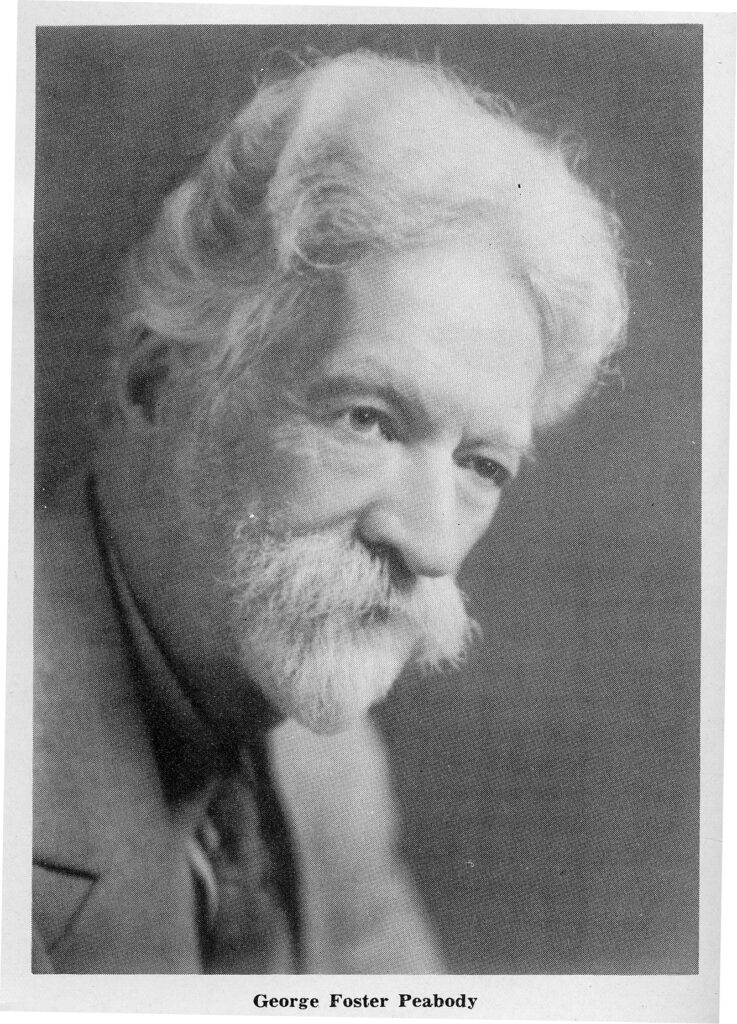Broadcasting’s most prestigious award, the George Foster Peabody Award, is given annually by the Grady College of Journalism and Mass Communication at the University of Georgia (UGA). Several awards are given for “distinguished achievement and meritorious service” by individuals, networks, stations, and organizations. Each winner receives a bronze medallion bearing the likeness of philanthropist and financier George Foster Peabody, a native of Columbus.
In 1938 the National Association of Broadcasters formed a committee to establish a prize, analogous to the Pulitzer Prize, for distinguished radio programs. The committee was headed by Lambdin Kay, manager of the WSB radio station in Atlanta. Lessie Smithgall, continuity editor at WSB, suggested that UGA administer the new broadcasting prize. John E. Drewry, the dean of the university’s journalism school, agreed to accept the challenge, and the prize was named for George Foster Peabody, one of the university’s main benefactors.

From George Foster Peabody, by L. Ware
The inaugural Peabody Awards, for radio, were given in 1941. Television awards followed in 1948, and cable television winners were first recognized in 1981. Awards for CD-ROM and multimedia were added in the late 1990s, and the inclusion of awards for the World Wide Web began in 2002. The winner of the first personal Peabody Award was the New York Times reporter and freelance writer Elmer Davis, who was a news analyst for CBS during World War II (1941-45) and later the director of the Office of War Information. Other Peabody winners have included Christiane Amanpour, Walter Cronkite, Bob Geldof (for the Live Aid concert), Charles Kuralt, Norman Lear, Studs Terkel, Orson Welles, and Oprah Winfrey.
John Drewry oversaw the Peabody Awards program until his retirement in 1963. Subsequent directors have been Worth McDougald, who served from 1963 to 1991; Barry Sherman, whose tenure lasted from 1991 until his sudden death in 2000; and Horace Newcomb, who succeeded Sherman. All have held faculty appointments in the Grady College of Journalism and Mass Communication at UGA.
The number of Peabody Awards varies from year to year, and merit is the sole basis for recognition. Individuals, companies, and organizations submit programs or news stories that they believe are worthy of consideration; typically, more than 1,000 such entries are received each year. Review committees at UGA watch or listen to all the submissions to determine which ones meet the awards’ standards of excellence. The selections of the review committees are forwarded to the board of directors, which makes the final decisions, first in regional meetings and then at a final plenary session. The board often selects, on its own, particular programs or individuals for special meritorious awards.
Some of the material submitted over the years is available to the public through the UGA Libraries Media Department, while other materials, such as scripts and entry forms, are housed in the Hargrett Rare Book and Manuscript Library at UGA. The collections include radio transcriptions, audiotapes, 16 mm kinescopes and prints, videotape reels, and cassettes, as well as CDs and CD-ROMs. The Peabody Awards Collection includes more than 40,000 entries.
Presentation of the awards is made in the spring, and for many years the ceremonies were held at a private luncheon, usually in New York City. In 2003 the Peabody Awards were broadcast for the first time, on the A&E cable network, with ABC’s Charles Gibson as host. The ceremony, held on May 19, 2003, aired later that week on May 25. Although the list of winners reads like a Who’s Who of broadcasting, local or non-network stations and individuals have also been recognized for their contributions to broadcast journalism and entertainment programming.





























